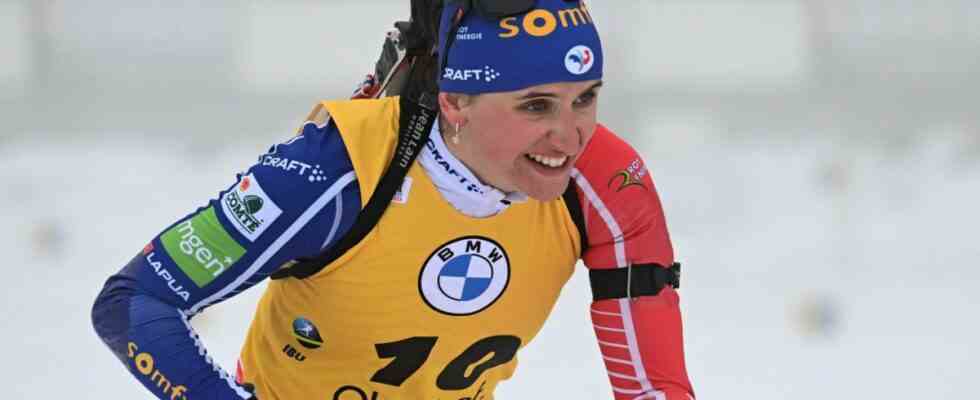The strength of the biathlete Julia Simon is to shoot faster than the spectators can cheer her hits. Especially when more than 27,000 roar at the same time, like on Sunday afternoon in Oberhof. There were almost as many in the World Cup arena as on the previous days together. Quite a few of them had in mind to inspire the German Denise Herrmann-Wick to her second gold medal. But there was this Julia Simon from France who didn’t let the audience dictate the rhythm. She dictates the rhythm.
The final standing stage of the Oberhof pursuit decided the gold and silver. Two women in a direct duel, Herrmann-Wick on the left, Simon on the right, and both presented not only the gun, but two quite contrary approaches. Herrmann-Wick needed 21 seconds from shot one to five, while Julia Simon only needed eight. The German could have made up for these 13 seconds on the cross-country ski run. But Simon not only fired her balls faster, but also more precisely: four hits in five shots, one penalty loop; Herrmann-Wick, meanwhile, got two of them. Gold was lost with it. However, the Norwegian Marte Olsbu Röiseland, coming from behind, could not catch up with Herrmann-Wick and finished third.
The piece of music “The train has no brakes” once again served as motivation for her second medal at this World Championships. The German team song chosen by the sporty team leader Herrmann-Wick is taken from the Ballermann fundus, although in German biathlon it is the Baller women in particular who are in good shape at the moment.
The other story is that of France’s Julia Simon, who has never won an individual medal at a World Championships before. “The atmosphere was totally crazy,” she said. “I’m an attacking biathlete, I took a lot of risks.” Simon started the pursuit from tenth place – and eventually only pursued Herrmann-Wick before she slowed down the German locomotive and train at the shooting range. During the last deposit while standing, she was relieved about the second missed shot by the Germans. “Sorry,” she whispered to her competitor at the press conference in the stadium. “But I know that Denise is very good on skis.”
Fair second: Denise Herrmann-Wick, right, had to congratulate Julia Simon on the win this time.
(Photo: Alexander Hassenstein/Getty)
However, the German convoy was not brought to a standstill. “Herrminatorin” banners could also be seen in the stadium on Sunday, based on the nickname of the former Austrian alpine dominator Herrmann Maier. In the Oberhof fog, there was a volume with a risk of sudden hearing loss whenever a German athlete showed up in the stadium. And that had a largely positive effect.
For example with Sophia Schneider from Chiemgau. The 25-year-old put on one of the best performances of her career – and still had chances for the bronze medal before the final standing stage. But then, as if imitating Herrmann-Wick, she also missed two of the last five targets at the shooting range – and finally finished fifth. “I didn’t quite make it at the end, where it would have counted, that annoys me a bit,” she said after the race. “The crowd carries you up, and then it all went by itself.” Similarly euphoric was Hannah Kebinger from Garmisch-Partenkirchen, who slipped into the team shortly before Oberhof and since then, unexpectedly for many, has been consistently among the best in the world. “Being able to start at a World Cup is a huge childhood dream that’s coming true,” she explained. Thuringia’s local hero, Vanessa Voigt, was the only German starter who waved her hand in disappointment. Five penalties meant 46th place for her.
Nevertheless, this day left increasing evidence that the much-vaunted German “train” has more to offer than its powerful steam engine: four Germans were among the top 20 of the 60 runners who started in this World Cup race. After five of twelve competitions, Germany is second in the medal table behind Norway, which thanks to the three world titles for Johannes Thingnes Bö is practically uncatchable in front – he managed the double gold from sprint and pursuit.
Train driver Denise Herrmann-Wick could have become the first German since Andrea Henkel to achieve this feat. But she didn’t seem particularly disappointed, now that well-known songs could be heard again in the stadium. “It was a great performance as a team today,” she said. “It’s a really good sign for the young girls, they’ve got what it takes, and that’s when things start moving forward.”

